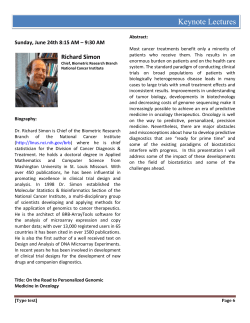
Shareholder Update February 2015
17 February 2015 Phylogica Shareholders Update • Phylogica and Genentech combine to search for new antibiotics to fight superbugs • Genentech partnership was second biggest licence deal by any ASX listed biotech in 2014 • Recent data confirms Phylogica’s cell penetrating peptides are ‘Best-in-Class’ for delivering biologics drugs inside cells • Phylogica uses its drug delivery solution to achieve unprecedented in vitro potencies against MYC – one of the ‘holy grails’ of cancer targets • Phylogica accelerating its proprietary Oncology discovery programme Letter from the CEO Dear Shareholders, We have made great strides in our scientific research over recent months underscored by an Option to License agreement with the global pharmaceutical giant Genentech in December. This was the second biggest licence deal by any ASX biotech company in 2014. In other highlights, we have also achieved early stage milestones in our key oncology programs and continue to generate exciting results using our novel Cell Penetrating Platform to deliver ‘smart drugs’ inside cells with exceptional potencies. Genentech deal This commercial collaboration to pursue discovery and development of novel antibiotics for treating superbug infections represents one of the biggest deals in Australian biotech in 2014. Under the terms of the agreement Phylogica received an upfront payment of US$500,000 (~AU $598,000) and is eligible to receive discovery, development, and commercialisation milestone payments totalling up to US$142 million. This alliance has the potential to address a critical unmet need for novel antimicrobials to treat bacterial infections including drug-resistant infections known as superbugs. These infections are a massive global health problem. A recent report commissioned by the UK’s Review of Antimicrobial Resistance predicted that if the spread of antimicrobial resistance continues unabated, it will lead to 10 million deaths per year and a reduction of 2-3.5% in worldwide GDP by 2050. The opportunity to tackle such a challenging problem with a partner of Genentech’s stature is testimony to our world-class science. We believe our approach has the potential to identify antimicrobial drugs with completely novel modes of action – the first in more than 30 years. We look forward to fully progressing the commercial and technical opportunities afforded by an alliance with such a highly regarded biopharmaceutical specialist. Exciting progress with our intracellular drug delivery and oncology platforms We continue to make substantial progress with our novel intracellular drug delivery platform by demonstrating it can improve access to targets inside cells that have proved beyond the reach of conventional therapies. www.phylogica.com 1 16 February 2015 Indeed, our preclinical investigations have shown we can deliver well characterised smart drugs inside cells, including a compound called Omomyc which turns-off a key oncology ‘master switch’ known as MYC, with unprecedented potencies. Further, our proprietary oncology programme has achieved several key early-stage milestones allowing us to accelerate plans to assess the activity of the leads we’ve identified in sophisticated cellular and animal models. Put simply, our peptide delivery technology is enabling a far greater range of smart drugs, or biologics, to reach important protein targets inside cells. This is a new frontier in drug development that promises to unlock the potential for smart drugs to treat diseases, such as cancer, more effectively and with fewer side-effects. In summary, this is a highly promising period in the life of your company. We are well positioned for scientific and commercial success with a promising cancer program, a uniquely differentiated drug delivery system and a major licensing deal struck with a global pharmaceutical company. These are key steps to unlock further investor value and ultimately deliver significant returns. We thank you for your ongoing support. Yours faithfully Dr Richard Hopkins Chief Executive Officer Progress with Phylogica’s intracellular drug delivery platform Already we have demonstrated that our proprietary cell penetrating peptides (FPPs) are 37-160 times more efficient than gold standard cell penetrating peptides, including the most clinically validated TAT peptide. We have a two-armed strategy to commercialise this highly promising platform. Mul$ple'commercialis$on'opportuni$es' ‘Value"Adding’" Improve,delivery,of,exis6ng, drugs,, Phylogica’s,Intracellular, Drug,Delivery,Solu6on, ‘Phylomer"Therapeu7cs’" Fully,integrated,drug,delivery/ discovery,pla>orm, Pla2orm'' Products' 1" Arm 1: ‘Value Adding’ existing drug cargoes to increase their potency Phylogica is combining our novel delivery technology with existing smart drugs to show we can improve their activity by improved intracellular delivery. To validate this approach we’ve hand-picked a panel of well characterised therapeutic cargoes and then assessed their activity when linked to our ‘best-in-class’ cell penetrating peptides. The outcome of this work has generated some highly encouraging data and established two very important principles. Firstly: our delivery solution offers potencies that consistently surpass those achieved using the previous gold-standard cell penetrating technology. Potency is a measure of drug activity. The more active the compound the lower the concentration needed to produce an effect – an outcome considered very favourable for drug development. Secondly: we can deliver different types of smart drugs with potencies below the micromolar (µM) level (see Figure below). Not only does this confirm our platform is robust, but it also addresses a key challenge from the pharmaceutical industry to show that our cell penetrating peptides can successfully deliver smart drugs (ie. biologics) in the sub micromolar range – widely acknowledged as a key potency threshold. www.phylogica.com 2 16 February 2015 Oncology Program ‘Value'Adding’:'Approaching'key'potency'thresholds' Drug'Amount' 10'µM' We have already achieved some important milestones with this program. CompeBtors% Increasing'Drug'Potency' Standard% CPP_Cargoes% Briefly we have: 1'µM' Phylomer% CPPs_Cargoes% <1µM%=%key%potency% threshold% Phylomer% CPPs_Toxins% 0.1'µM' 1" Phylogica is now engaging with select academic and commercial collaborators to access a broader range of therapeutic cargoes, as well as their established cellular and animal models systems where we can rapidly evaluate functional activity. The overall goal is to show that Phylogica’s cell penetrating platform offers a versatile solution for delivering a broad range of therapeutic smart drugs, including proteins and peptides and potentially even nucleic acids (eg siRNA or antisense oligonucleotides), inside diseased cells. We will look forward to updating investors with results from these collaborations. Arm 2: developing a fully integrated drug development platform We are also determined to transition Phylogica’s world-class platform technologies into valuable commercial products. With the recent launch of our inhouse oncology program, Phylogica has already taken a significant step towards achieving this goal. Phylogica’s,Proprietary,Oncology,Program, , ! Phylomer)screens)against)4)validated)and)clinically)relevant)oncology)targets) ) Program, Indica6on, Discovery, Func6onal, Valida6on, In"vitro" , MYC, , Breast,Cancer, Stat,5, Breast,Cancer, , YB1, , , Breast,Cancer, , • Selected several high-value ‘Transcription Factor’ (definition provided below) targets known to play an important role in many cancers • Successfully completed primary Phylomer screens, which yielded >100 hits/ for most targets • Analysed hits using Phylogica’s proprietary bioinformatics suite. We have initiated the next phase to screen the large pool of hits for functional activity in appropriate cell-based assays. This phase is scheduled for completion by 1H 2015 and is expected to yield lead candidates that will be assessed for activity in animal models during the second half of the year. More details on the program will be provided in subsequent updates. Technology Focus: Targeting MYC – a master controller driving multiple cancers All cancers involve cells growing uncontrollably. Important genes, referred to as ‘Oncogenes’ are critical for regulating this process. Whenever an oncogene acquires a mutation it can trigger a process of uncontrolled cell growth that ultimately leads to cancer. One of the most important classes of oncogene are the “Transcription Factors”. These act as master regulators relaying critical messages within the cell and controlling the switching on and off of many other genes that drive cancer and other diseases. Developing drugs to turn off Transcription Factors is a major goal for the pharmaceutical industry. Preclinical, In"vivo" MYC: The ‘holy grail’ of targets MYC was first identified as a critical driver of cancer some 40 years ago and is classified as both a Transcription Factor and a validated oncogene. MYC is ‘activated’ in most human cancers (>50%) and is associated with poor clinical outcomes. 1" www.phylogica.com 3 16 February 2015 Inhibiting MYC can eradicate existing tumours MDA-MB-468 72h Viability - 0.56µM There is compelling genetic evidence that direct inhibition of MYC can lead to complete eradication of existing tumours. 100 % Viability In one particularly elegant experiment conducted by Dr Laura Soucek at UCSF, mice were genetically engineered to produce MYC-dependent lung cancers. When expression of a potent MYC inhibitor, ‘omomyc’, was switched on in these animals, the established tumours were eradicated. Similar results have also been observed with blood cancers like leukaemia and lymphoma, as well as for liver, pancreatic, lung and brain cancers. *** 50 Competitive landscape While MYC remains one of the most sought after targets in cancer it has proven elusive to direct inhibition with potent conventional small molecule therapies. Alternative small molecule drug classes, such as the BET-Bromodomain inhibitors, are thought to inhibit MYC indirectly. While several BET inhibitors have been fasttracked for clinical development as anti-cancer treatments, significant safety concerns remain due to lack of specificity. Phylomers deliver a MYC inhibitor (Omomyc) with unprecedented potencies Phylogica owns a cell penetrating peptide known as 1746. We linked this with the small protein Omomyc inhibitor of MYC, which is able to block this transcription factor but is not able to get inside cells by itself 1746 17 46 _O m yc O m yc 0 ! To our knowledge this is the most potent direct inhibition of the MYC oncoprotein target yet described. Why this breakthrough is important While still at the experimental stage, this outcome puts Phylogica at the forefront of international efforts to develop drugs against one of the most highly prized targets in cancer. More generally, it pioneers the feasibility of using of biologics drugs against traditionally challenging target classes such as the transcription factors, which have so far eluded conventional small molecule therapies. We are greatly encouraged by these results and are determined to fully exploit the value of our drug delivery technology and its ability to access previously unreachable cell targets that could hold solutions for a range of diseases. omomyc We tested this fusion protein against cells derived from a particularly aggressive form of breast cancer known to be hard to treat with conventional drugs (MDA-MB-468 cells). We found that when we added a very low dose of the peptide (0.56µM) approximately half of the cancer cells were killed. Significant cell death was also observed at even lower concentrations of drug (0.28 µM). In contrast a control Omomyc protein, which lacked our Phylomer CPP and therefore couldn’t penetrate cells, had no effect. www.phylogica.com 4
© Copyright 2025













